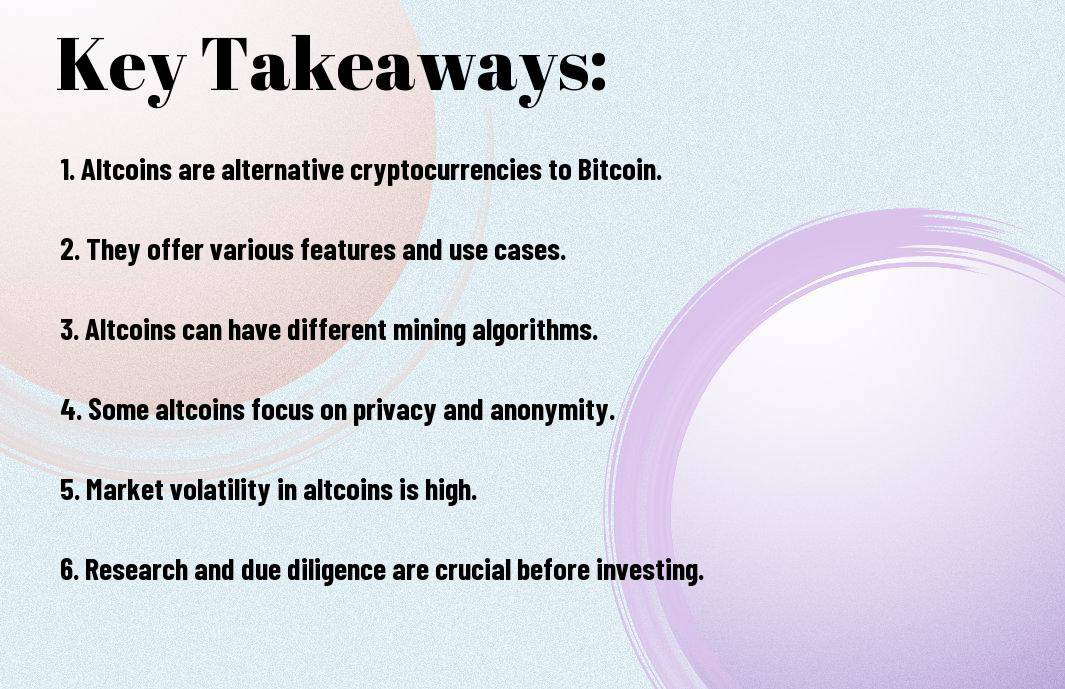
Newsletter Subscribe
Enter your email address below and subscribe to our newsletter

Enter your email address below and subscribe to our newsletter

An exploration of the world of altcoins unveils a vast and diverse landscape beyond Bitcoin. While Bitcoin remains the most well-known and widely used cryptocurrency, there are thousands of altcoins offering unique features and functionalities. This guide will probe into the varied world of altcoins, shedding light on their differences, strengths, and potential risks.


Assuming you are familiar with Bitcoin and its impact on the world of cryptocurrency, it’s time to investigate into the diverse universe of altcoins. If you want to learn more about this fascinating topic, check out this insightful article on Beyond Bitcoin: Exploring the World of Altcoins While Bitcoin.
For investors and enthusiasts, understanding market capitalization in the world of altcoins is crucial. This metric helps determine the size and relevance of a particular altcoin in comparison to others. Market capitalization reflects both the price per coin and the total supply in circulation, giving a sense of the coin’s overall value in the market.
For those exploring the world of altcoins, it’s necessary to grasp the various types of altcoins available. From privacy coins like Monero to utility tokens such as Binance Coin, each serves a unique purpose in the cryptocurrency ecosystem. Stablecoins offer price stability backed by fiat currencies, while security tokens represent ownership of real-world assets like company shares.
| Types of Altcoins | Description |
| Privacy Coins | Focus on anonymity and security |
| Utility Tokens | Used for specific services or products |
| Stablecoins | Maintain stable value pegged to assets |
| Security Tokens | Represent ownership of real-world assets |
| Payment Coins | Designed for transactions and payments |
For instance, privacy coins like Monero offer enhanced anonymity features, making transactions nearly untraceable. Meanwhile, security tokens represent digitized ownership of assets like real estate or stocks, introducing new opportunities for investors. Understanding the distinctions between these altcoin categories is crucial for making informed investment decisions in the cryptocurrency market.
Your exploration of altcoins will reveal a variety of consensus mechanisms beyond the traditional Proof-of-Work (PoW) model used by Bitcoin. These mechanisms play a crucial role in how transactions are validated and new blocks are added to the blockchain. From Proof-of-Stake (PoS) to Delegated Proof-of-Stake (DPoS) and Byzantine Fault Tolerance (BFT), each offers unique benefits and challenges.
On the forefront of advancements in blockchain technology is the Delegated Proof-of-Stake (DPoS) consensus algorithm. DPoS aims to improve the scalability and energy efficiency of blockchain networks by utilizing a select group of delegates to validate transactions and produce new blocks. This innovative approach enhances network performance and reduces the environmental impact associated with traditional PoW systems.
The implementation of DPoS has led to faster transaction speeds, lower fees, and increased network security. By prioritizing efficiency and decentralization, DPoS has gained popularity among altcoin projects seeking to address the limitations of existing consensus mechanisms.

Not all altcoins are created equal, and with thousands of options available, investors need to carefully assess the potential of each before making any decisions. Understanding the technology behind the altcoin, its use case, market demand, team behind the project, and community support are crucial factors to consider. Some altcoins may offer innovative solutions to real-world problems or provide unique features that set them apart from the competition, making them potentially lucrative investments.
Altcoins, while offering great potential for profit, also come with significant risks and considerations that investors should be aware of. Market volatility, regulatory uncertainty, security vulnerabilities, and lack of liquidity are all factors that can impact the value of altcoins. It is imperative for investors to conduct thorough research, diversify their portfolio, and stay informed about market trends to mitigate these risks.
It is imperative to exercise caution and due diligence when investing in altcoins, as the market is highly speculative and subject to sudden price fluctuations. Investors should also be wary of scams, pump-and-dump schemes, and fraudulent projects that prey on unsuspecting individuals looking to capitalize on the cryptocurrency market.
All financial systems are undergoing a transformation with the rise of decentralized finance or DeFi. This revolutionary movement aims to disrupt traditional central authorities by leveraging blockchain technology. DeFi platforms facilitate financial services without the need for intermediaries, offering users unprecedented control over their assets. According to Beyond Bitcoin: Exploring the Exciting World of Altcoins, DeFi projects are built on smart contracts, enabling automated transactions and lending/borrowing services in a trustless environment.
One of the key components that empower DeFi platforms are altcoins. These alternative cryptocurrencies play a crucial role in providing liquidity, governance, and utility within the DeFi ecosystem. Altcoins such as Ethereum, Binance Coin, and Chainlink are the backbone of various DeFi projects, serving as means of exchange, collateral, and incentivization for network participants.
With altcoins driving the innovation in DeFi, users can access a wide range of financial services, including decentralized exchanges, lending protocols, and yield farming opportunities. However, it is important for participants to conduct thorough research and exercise caution due to the volatility and security risks associated with altcoins in the DeFi space. Despite the risks, the potential for high returns and financial inclusion in DeFi makes altcoins an integral part of the future of finance.
Their intriguing nature lies in their uniqueness and indivisibility. Non-fungible tokens (NFTs) are digital assets that represent ownership or proof of authenticity of a specific item or piece of content, recorded on a blockchain. Unlike cryptocurrencies like Bitcoin or Ethereum, where each token is interchangeable and holds the same value, NFTs are one-of-a-kind and cannot be replicated. This characteristic opens up a world of possibilities for artists, creators, and even collectors.
Their role in the NFT ecosystem goes beyond just being a means of transaction. Altcoins are playing a crucial role in powering the growth of the NFT market. Specific altcoins have been designed to support NFT transactions, provide infrastructure for NFT marketplaces, or even serve as the native currency for NFT platforms. These altcoins offer efficiency, security, and unique features tailored to the needs of the NFT community.
Tokens such as ENJ, CHZ, and MANA have emerged as prominent players in the NFT space, offering innovative solutions and enhancing the overall NFT experience. They facilitate seamless transactions, enable fractional ownership of high-value assets, and empower creators to monetize their work in novel ways. As the NFT market continues to expand, these altcoins are set to play an increasingly significant role in shaping its future.
To truly understand the potential of altcoins beyond their financial value, it is important to explore their impact on social causes and charitable initiatives. Altcoins have the power to revolutionize the way we approach social issues, offering new avenues for social entrepreneurship and charitable giving.
To harness the power of altcoins for social entrepreneurship means leveraging blockchain technology for social good. Altcoins provide new forms of funding for social enterprises seeking to address pressing issues such as environmental sustainability, poverty alleviation, and healthcare access. By utilizing altcoins, these enterprises can access a global network of supporters and investors who are aligned with their social missions, fostering a more inclusive and sustainable approach to business.
For those looking to support charitable causes, altcoins offer a unique opportunity to make a meaningful impact. By donating altcoins to charitable organizations, individuals can support causes they are passionate about in a transparent and secure manner. The decentralized nature of altcoins ensures that donations reach their intended recipients without the need for intermediaries, reducing transaction costs and increasing the efficiency of charitable giving.
Altcoins provide a direct way for individuals to support causes they care about without the limitations of traditional financial systems. With lower fees and faster transaction times than traditional currencies, altcoins can facilitate real-time donations to support emergency relief efforts or ongoing charitable projects. Additionally, the transparent nature of blockchain technology enables donors to track how their contributions are being used, building trust and accountability within the charitable sector.

Now, as we peer into the future of altcoins, the possibilities and potential for these diverse digital assets are truly remarkable. While Bitcoin remains the titan of the crypto world, altcoins are steadily gaining ground and carving out their own niches in the market. The future of altcoins holds immense promise and opens up a world of exciting opportunities for innovation and growth in the financial ecosystem.
Financial experts predict that altcoins will continue to expand their influence and utility in the financial ecosystem. As regulatory clarity improves and institutional interest grows, altcoins are likely to become more deeply integrated into traditional financial systems. This could lead to increased adoption and acceptance of altcoins as legitimate investment vehicles, providing users with more options to diversify their portfolios and hedge against traditional market volatility.
Altcoins are poised to drive forward groundbreaking innovations in the world of finance. With advancements in blockchain technology and smart contracts, altcoins have the potential to revolutionize industries beyond just finance. Projects focusing on scalability, interoperability, and privacy are gaining traction, paving the way for a more efficient and inclusive financial landscape. The future of altcoins holds the key to unlocking a new era of decentralized solutions that can benefit individuals and businesses alike.
Horizon: As altcoins continue to evolve and push the boundaries of what is possible in the financial world, it is important to stay informed and vigilant. While the potential for growth and innovation is vast, there are also risks to consider, such as regulatory challenges and market volatility. By staying informed and adopting a cautious approach, investors and enthusiasts can navigate the evolving landscape of altcoins wisely and capitalize on the opportunities presented by these digital assets.
On the whole, the world of altcoins offers a wide array of digital currencies beyond Bitcoin, each with its own unique features and use cases. From Ethereum’s smart contract capabilities to Ripple’s focus on cross-border payments, altcoins are pushing the boundaries of what is possible with blockchain technology. Investors and enthusiasts have a wealth of options to explore, each with its own risks and potential rewards.
As the cryptocurrency market continues to evolve and mature, it is crucial for individuals to stay informed and do thorough research before investing in any altcoins. Understanding the technology, team behind the project, and market demand are key factors to consider. With careful consideration and a long-term perspective, altcoins can offer exciting opportunities for those looking to diversify their cryptocurrency holdings beyond Bitcoin.
A: Altcoins are alternative cryptocurrencies to Bitcoin. They can have different functions, features, and technologies compared to Bitcoin.
A: Altcoins have the potential for high returns due to their price volatility. They also offer diversification in your cryptocurrency investment portfolio.
A: Altcoins differ from Bitcoin in terms of their underlying technology, market capitalization, and use cases. Each altcoin serves a unique purpose.
A: Some popular Altcoins include Ethereum (ETH), Ripple (XRP), Litecoin (LTC), and Cardano (ADA).
A: Yes, Altcoins are considered risky investments due to their price volatility, regulatory uncertainty, and market speculation. It’s crucial to conduct thorough research before investing.
A: You can purchase Altcoins on cryptocurrency exchanges such as Binance, Coinbase, or Kraken. You’ll need to create an account, deposit funds, and place buy orders for the Altcoins.
A: Before investing in Altcoins, consider factors such as the team behind the project, technology, market demand, competition, and potential for growth. It’s important to have a clear investment strategy and risk management plan.